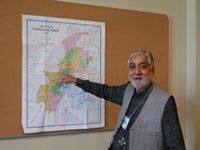A dozen international peacemakers from 10 countries around the world will visit congregations and presbyteries of the Presbyterian Church (U.S.A.) from Sept. 24-Oct. 18.
They will share their stories about church-based ministries in their countries that seek peace justice and pursue peace in the name of Jesus Christ. This year’s international peacemakers come from Bolivia, Central Asia, Colombia, Democratic Republic of the Congo, Indonesia, Israel/Palestine, Mexico, Pakistan, the Philippines and Sudan.
The International Peacemaker program is sponsored by the Presbyterian Peacemaking Program.
Bishop Mano Rumalshah is bishop emeritus of the Church of Pakistan’s Diocese of Peshawar, in the deeply troubled territory of western Pakistan that borders Afghanistan.
He was raised and educated in Pakistan, but has pastored congregations in both England and Pakistan. Ramalshah and his wife are dedicated to developing interfaith relationships and cross-cultural communication.
Where will you be going?
- Seattle Presbytery
- Muskingum Valley Presbytery
- North Central Iowa Presbytery
- East Iowa Presbytery
- Heartland Presbytery
What is the situation in your country that you will be addressing?
"In Punjab we have all the major religions of the world — either we are very gullible or we are true seekers."
"Everything in our area is so split apart that our focus must be on reconciled relationships. It is a compulsion with me, to serve those who are alienated from each other and are killing each other. I am convinced that the ultimate purpose of God's entry into the human scene was to reconcile, so with every breath that we breathe we must bear witness to reconciliation. It is an ongoing process, like a washing machine — we keep putting our dirty laundry in and getting clean laundry out."
How are the faith communities (your’s in particular) addressing this situation?
"Interfaith relations has become a kind of business, and sadly, most of it ends with nothing more than 'tea and sympathy.' It hasn't reached to where the guns and blood are flowing in Pakistan. At least in my area there is a huge desire. We have an effort called ‘Faith Friends' to bring people together. Faith is the magnet that brings us together, not a religious label. It is inevitable that we will group religiously, but we try to reach beyond in small ways. For instance, if we are visiting a Christian family with food packets, we take two and ask them to give the other one to a Muslim neighbor. We engage in mutual visits on Eid and Christmas. "Prejudice is inevitable but legal discrimination is unacceptable. We must not tolerate 'guilt by religion.'"
What lessons from your situation are you trying to communicate to U.S. Presbyterians?
"The majority/minority reality is predominant everywhere in the world so reconciliation work is necessary everywhere because brokenness exists everywhere. We who are a Christian minority in Pakistan urge you to be sure you do not treat religious minorities here the way we are treated in Pakistan."
What is the primary message you want to communicate to U.S. Presbyterians?
"Someone has to take up the issue of Christian presence in Islamic countries, where it is receding. This is a cry from the heart. Politicians talk about 'saving' Pakistan as state. Where is the urgency with regard to the Christian presence in the country?"

